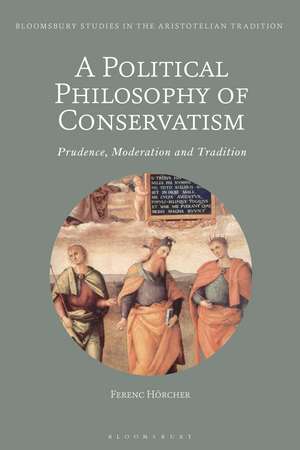A Political Philosophy of Conservatism: Prudence, Moderation and Tradition: Bloomsbury Studies in the Aristotelian Tradition
Autor Dr Ferenc Hörcheren Limba Engleză Paperback – 28 iul 2021
| Toate formatele și edițiile | Preț | Express |
|---|---|---|
| Paperback (1) | 216.99 lei 6-8 săpt. | |
| Bloomsbury Publishing – 28 iul 2021 | 216.99 lei 6-8 săpt. | |
| Hardback (1) | 597.78 lei 6-8 săpt. | |
| Bloomsbury Publishing – 22 ian 2020 | 597.78 lei 6-8 săpt. |
Din seria Bloomsbury Studies in the Aristotelian Tradition
- 20%
 Preț: 219.57 lei
Preț: 219.57 lei -
 Preț: 193.36 lei
Preț: 193.36 lei - 23%
 Preț: 191.22 lei
Preț: 191.22 lei - 23%
 Preț: 191.31 lei
Preț: 191.31 lei - 14%
 Preț: 512.22 lei
Preț: 512.22 lei - 30%
 Preț: 511.48 lei
Preț: 511.48 lei - 22%
 Preț: 236.45 lei
Preț: 236.45 lei - 22%
 Preț: 239.85 lei
Preț: 239.85 lei - 22%
 Preț: 230.51 lei
Preț: 230.51 lei - 13%
 Preț: 222.55 lei
Preț: 222.55 lei - 23%
 Preț: 199.10 lei
Preț: 199.10 lei - 23%
 Preț: 198.12 lei
Preț: 198.12 lei - 23%
 Preț: 198.57 lei
Preț: 198.57 lei - 30%
 Preț: 510.42 lei
Preț: 510.42 lei - 30%
 Preț: 510.49 lei
Preț: 510.49 lei - 30%
 Preț: 511.14 lei
Preț: 511.14 lei - 30%
 Preț: 511.48 lei
Preț: 511.48 lei -
 Preț: 250.59 lei
Preț: 250.59 lei
Preț: 216.99 lei
Preț vechi: 274.53 lei
-21% Nou
Puncte Express: 325
Preț estimativ în valută:
41.52€ • 43.27$ • 34.38£
41.52€ • 43.27$ • 34.38£
Carte tipărită la comandă
Livrare economică 03-17 aprilie
Preluare comenzi: 021 569.72.76
Specificații
ISBN-13: 9781350251311
ISBN-10: 1350251313
Pagini: 216
Dimensiuni: 156 x 234 x 17 mm
Greutate: 0.31 kg
Editura: Bloomsbury Publishing
Colecția Bloomsbury Academic
Seria Bloomsbury Studies in the Aristotelian Tradition
Locul publicării:London, United Kingdom
ISBN-10: 1350251313
Pagini: 216
Dimensiuni: 156 x 234 x 17 mm
Greutate: 0.31 kg
Editura: Bloomsbury Publishing
Colecția Bloomsbury Academic
Seria Bloomsbury Studies in the Aristotelian Tradition
Locul publicării:London, United Kingdom
Caracteristici
Brings the virtue of prudence back into discussions of political philosophy, using Aristotelian teaching on practical wisdom and its aftermath
Notă biografică
Ferenc Hörcher is Head of the Research Institute of Politics and Government of the National University of Public Service, Hungary, and a Senior Research Fellow of the Institute of Philosophy of the Hungarian Academy of Sciences, Hungary. He is member of the editorial board of Politeja, Journal of the Faculty of International and Political Studies of the Jagiellonian University, Krakow, Poland and Hungarian Review.
Cuprins
Acknowledgements Introduction: Prudence and conservatism Part One: Prudence in history 1. Ancient and Christian traditions of prudence 2. Renaissance and early modern prudentia 3. Late modern prudentiaConclusion of Part One Part Two: Prudence in conservative philosophy Preliminary remarks4. Agency-constraint5. Time-constraint6. Knowledge-constraint7. The prudent individual's resources: Virtues and character8. The prudent community's resources: Tradition and political culture9. How to find the proper action in politicsSummary: A conservative political philosophy of prudence Notes Bibliography Index of Names Index of Subjects
Recenzii
A learned and spirited defense of prudence that draws on an eclectic array of sources from history, philosophy, and political theory, [Hörcher's] book offers a rich reconsideration of an ancient virtue that should remain central to any form of conservatism.
Hörcher poses the catchy question, which has been examined by a number of major conservative thinkers of the past, including Nisbet, Kirk and others: is conservatism an ideology or is it not? ... Hörcher's book is a valuable piece added to the huge and magnificent mosaic, which helps to map the philosophical roots of conservatism.
In this wise and timely book, Ferenc Hörcher calls for a new approach to politics based on the Aristotelian virtue of prudence. In contrast to forms of conservatism that aim at maximizing economic freedom or that buttress national ambitions with amoral realism, Hörcher's conservatism focuses on the need for rulers and citizens to cultivate practical wisdom-a wisdom to be discovered above all in the study of history and the Western tradition of prudent statecraft. He urges the rebuilding of politics in a way that would restore a proper sense of the constraints imposed by our cultural traditions and by the human condition more generally. Required reading for anyone disturbed by the collapse of statesmanship in the contemporary world.
[The Political Philosophy of Conservatism] will be helpful to readers less familiar with the general themes and historical method of the contemporary Cambridge school of political thought.
Hörcher poses the catchy question, which has been examined by a number of major conservative thinkers of the past, including Nisbet, Kirk and others: is conservatism an ideology or is it not? ... Hörcher's book is a valuable piece added to the huge and magnificent mosaic, which helps to map the philosophical roots of conservatism.
In this wise and timely book, Ferenc Hörcher calls for a new approach to politics based on the Aristotelian virtue of prudence. In contrast to forms of conservatism that aim at maximizing economic freedom or that buttress national ambitions with amoral realism, Hörcher's conservatism focuses on the need for rulers and citizens to cultivate practical wisdom-a wisdom to be discovered above all in the study of history and the Western tradition of prudent statecraft. He urges the rebuilding of politics in a way that would restore a proper sense of the constraints imposed by our cultural traditions and by the human condition more generally. Required reading for anyone disturbed by the collapse of statesmanship in the contemporary world.
[The Political Philosophy of Conservatism] will be helpful to readers less familiar with the general themes and historical method of the contemporary Cambridge school of political thought.
